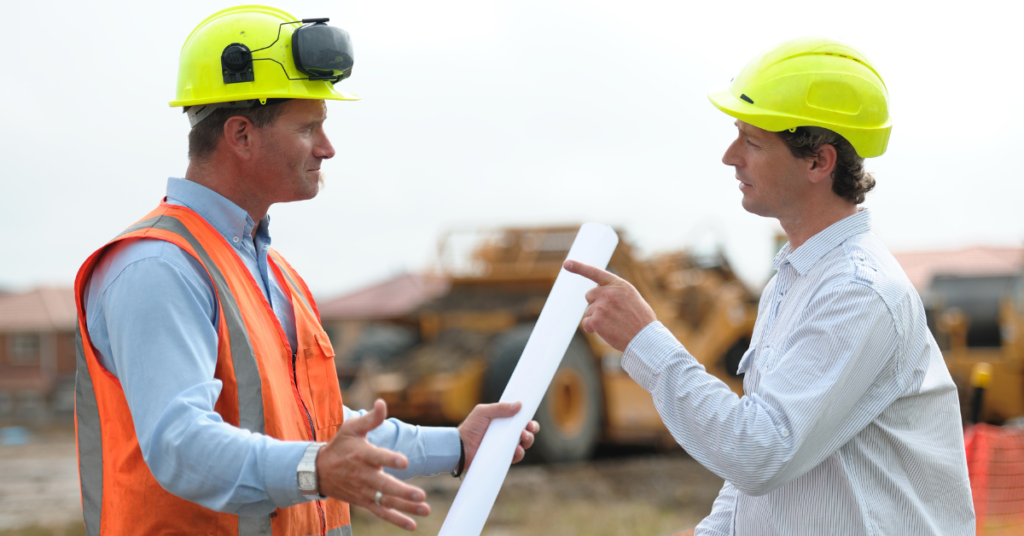Construction projects are often complex, and disputes are common. Various methods are available for resolving a construction dispute, each with its own strengths and weaknesses.
In this article, we will discuss different dispute resolution methods and common types of construction disputes that may arise in a project.
What is Construction Dispute Resolution?
Construction dispute resolution refers to the methods used to resolve disputes that may arise in a construction project, such as negotiation, mediation, arbitration, and litigation. In most cases, the method of dispute resolution is specified in the construction contract itself.
Strategies and Methods to Resolve Construction Disputes
The most common methods of dispute resolution are discussed below:
Negotiation and Mediation Techniques
Negotiation is a widely accepted method for resolving disputes. In this method, the parties work through their issues amicably and try to find mutually acceptable solutions.
Negotiation is not only cost-effective but also helps preserve working relationships between the parties. It is usually the first step in construction disputes and is attempted before the parties resort to other dispute resolution methods, such as litigation or arbitration.
In Mediation, a neutral third party (known as a Mediator) is appointed to assist the parties in the negotiation process. A Mediator is a skilled person who helps the parties reach a consensus on their disputes.
Mediation is similar to negotiation in the sense that both involve amicable dispute settlement. However, negotiation involves direct discussions between the parties without the intervention of a third party.
Dispute Review Board and Expert Determination
Some construction contracts contain a clause for establishing a Dispute Resolution Board (DRB) to determine the issues in the dispute. A DRB consists of an independent committee, typically comprising one to three members. Depending on its powers as set out in the construction contract, a DRB may issue either non-binding recommendations or a binding decision.
The parties may also choose to submit their disputes to an independent third party that is well-equipped to handle construction-related technical issues such as delay and quantum.
Litigation and Arbitration Processes For Construction Disputes
Litigation means settling disputes in a court of law where the standard court procedure is followed. In contrast, arbitration is a process of resolving disputes outside the court system, where the disputes are submitted to one or more arbitrators.
An arbitrator is an impartial and qualified third party appointed by or on behalf of the parties. Arbitration Awards are legally binding as a court decision.
Arbitration is a preferred alternative to litigation in construction disputes. It involves a thorough analysis of complex construction issues. Unlike litigation, arbitration enables the parties to select arbitrators with extensive knowledge and experience in the construction industry.
Furthermore, parties can also appoint technical experts (with specialist construction knowledge) to carry out in-depth delay and quantum analysis.
Construction disputes arbitration has gained significant popularity in recent years, primarily due to the numerous advantages it offers such as in-depth analysis of dispute, confidentiality of proceedings and award, finality of award, specialist knowledge and expertise of arbitrators etc.
Hybrid Dispute Resolution
Parties sometimes opt for hybrid dispute resolution, which involves combining two or more methods, such as mediation followed by arbitration.
Common Types of Construction Disputes
The most common disputes in construction projects are payments, delays, variations, non-completion of works, and defective works, as discussed in detail below:
Project Delays
Delays are a significant concern in construction projects. Most projects face delays, which can be due to several reasons, such as poor project planning, delayed submission of drawings, delayed approvals, unavailability of labour/materials, weather conditions, inefficient communication, etc.
The main issue to be determined in such cases is which party is responsible for the delay. If the delay is attributable to the contractor, the employer has the right to claim delay damages. If the delay is attributable to the employer, the contractor can claim compensation as prolongation costs.
Variation or Change Orders Requests
Variations refer to modifications in the original scope of work that result in the addition or omission of work, such as alteration to the design, changes in quantities required, etc. Such variations generally require cost adjustments (additions or deductions) in the original contract sum, which may result in disagreement between the parties over valuation.
For example, a dispute may arise when the employer requests additional work but doesn’t agree to pay the additional costs. The parties may also argue whether a particular instruction constitutes a variation, i.e., whether it is within or outside the contract scope.
Late payment
Payment disputes are very common in construction projects. They can arise for reasons such as incorrect invoicing, unclear payment terms, inadequate cash flow planning, disagreement over variations and extent of work done, etc.
Delayed payments can cause extreme financial stress for the contractor. If the contract allows, a contractor may suspend the performance of its works in case of non-payment or late payment. A contractor may also seek damages or interest on the delayed payment.
Non-Completion of Work and Defective Work
Another common reason for dispute is incomplete and/or defective works where the work performed by the contractor/subcontractor is either incomplete or not as per the specified requirements or of substandard quality.
In most construction contracts, a Defect Liability Period (“DLP”) is specified during which an employer can require the contractor to rectify the defects. The DLP is usually between 12-24 months from the date of completion of the project.
A dispute may arise if the employer instructs the contractor to rectify certain defects and the contractor refuses to fix or fails to rectify the defects within a reasonable time. In such cases, the employer may undertake the remedial work itself and deduct the cost of remedial works from the contract price.
Best Practices for Dispute Management and Preventing Construction Disputes
Construction disputes are costly and time-consuming. The best way to deal with them is to nip them in the bud and prevent them from escalating.
Below, we have suggested some techniques for early dispute identification and resolution.
Importance of Effective Communication
Effective communication is of the utmost importance in construction projects, as multiple stakeholders, such as employers, contractors, subcontractors, consultants, and suppliers, are involved.
Clear and effective communication between parties can help avoid misunderstandings and prevent potential disputes. It is important to establish clear communication channels and a chain of command during every project phase. Adopt practices such as:
– maintaining a record of important project communication,
– encouraging open discussion and feedback,
– promoting team-building activities.
Role of Progress Tracking, Daily Project Records and Meticulous Record Keeping
Progress tracking means monitoring and documenting the progress of construction projects. This includes on-site inspections, scheduling regular meetings, maintaining daily project records and timesheets, and producing daily, weekly, and monthly progress reports.
Various project tracking tools can be used for this purpose. Project tracking helps manage timelines and prevent project delays.
Clarity of Construction Contract and Adherence to Contract Terms
Construction disputes often involve issues related to contractual interpretation. Parties usually disagree on the interpretation of contractual provisions. Therefore, it is crucial to draft construction contracts adequately using clear and concise language.
Ambiguous phrases and terms should be avoided. Clauses related to the scope of work, delay penalties, extension of time, dispute resolution, price, and payment should be drafted with utmost care.
Technological Advancements in Dispute Resolution
Due to the rapid advancement in technology, there has been a paradigm shift in traditional dispute resolution procedures. Remote hearings/Virtual hearings have become increasingly popular because of their cost-saving advantages.
Virtual hearings are convenient for all parties as they cut down the need for travel. Parties are also resorting to Online Dispute Resolution (“ODR”) platforms that integrate forms of modern technology such as artificial intelligence (AI) and cloud computing.
ODR platforms are considered the future of dispute resolution. These platforms will continue to evolve with further advancements in technology.
Online Dispute Resolution in UAE
The UAE Ministry of Justice has recently introduced an electronic mediation platform to resolve commercial disputes.
The Abu Dhabi Global Market (ADGM) Arbitration Centre has also introduced an online dispute resolution platform that provides digitalised settlement and mediation services, including self-guided negotiations and mediation facilitated by internationally accredited mediators.
As mentioned on ADGM’s website, parties can submit a dispute via the platform and are guided through a series of questions that tailor a settlement offer to the other party. The other party is then invited to join the platform to engage in the negotiation.
Once both parties are registered, online negotiation commences, with flexible deadlines depending on the parties’ needs and requirements. If an offer is accepted, a template settlement agreement is available via the platform, allowing for a self-driven solution.
Alternatively, parties can create their own settlement agreement with the assistance of their legal representatives.
If a settlement is not reached via negotiation, parties have the option to access a mediator, which continues to allow them to stay in control of the outcome of their dispute. With the utmost confidentiality and flexibility, the mediator will actively assist parties in bridging the gap in their settlement discussions and reach a compromise that they both can accept.
Get Expert Legal Help on Construction Dispute Resolution
Navigating the intricacies of legal issues requires more than just knowledge; it demands experience, expertise, and a deep understanding of the local legal landscape. We at SK Legal provide the following services:
- Comprehensive legal consultancy: Whether you’re dealing with civil or commercial disputes, our team is equipped to provide you with the best legal advice.
- Support during negotiations: Our legal advisory services extend to assisting clients during crucial negotiations, ensuring their interests are always protected.
- Collaboration with local law firms: We understand the nuances of local jurisdictions. That’s why we collaborate with licensed local law firms to oversee court cases, especially in Dubai and Sharjah courts.
For personalised assistance and advice, contact us at [email protected]
Frequently Asked Questions about Construction Dispute Resolution
A construction dispute is a disagreement or conflict between the parties involved in a construction project. Multiple parties are involved in a construction project, and disputes can arise between two or more parties, such as client/employer and contractor, main contractor and subcontractor, employer/contractor and design professional/architect, employer/contractor and supplier, etc.
Dispute resolution helps safeguard the interests of all parties by enabling them to resolve their conflicts efficiently.
Various methods are available for resolving a construction dispute, each with its own strengths and weaknesses. In most cases, the method of dispute resolution is specified in the construction contract itself.
There can be several causes of construction disputes. The most common disputes are related to payments, delays, variations, non-completion of works, defective works, design mistakes, and quality of material.
The most common dispute resolution methods are Negotiation, Mediation, Dispute Resolution Board, Expert Determination, Arbitration and Litigation.
Some construction contracts contain a clause for establishing a Dispute Resolution Board (“DRB”) to determine the issues in the dispute. A DRB consists of an independent committee, typically comprising one to three members. Depending on its powers as set out in the construction contract, a DRB may issue either non-binding recommendations or a binding decision.
The three most common areas where a construction dispute can arise are project delays, non-payment or delayed payment and variations to the original scope of work.
Construction disputes can have a cascading effect on the construction project, resulting in significant delays and cost overruns. They can also further damage the working relationships of the parties involved in the project and negatively impact their future business prospects.
A mediator is a neutral third party appointed to assist the parties in the negotiation process. A mediator helps the parties reach a consensus on their disputes.
Disclaimer
This publication does not provide any legal advice and it is for information purposes only. You should not rely upon the material or information in this publication as a basis for making any business, legal or other decisions. Therefore, any reliance on such material is strictly at your own risk.
Share This Post On:
Sameer A Khan
Let SK Legal be your trusted partner in Construction Disputes Resolution in the UAE
Don’t navigate these challenges alone. For personalised assistance and advice on construction dispute resolution in the UAE, contact us at [email protected].
CONTRIBUTOR

Sameer Khan is one of the Best Legal Consultants in UAE, and Founder and Managing Partner of SK Legal. He has been based in UAE for the past 14 years. During this time, he has successfully provided legal services to several prominent companies and private clients and has advised and represented them on a variety of projects in the UAE.
View all posts




